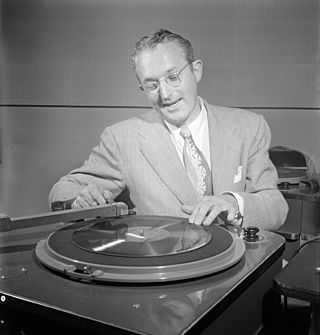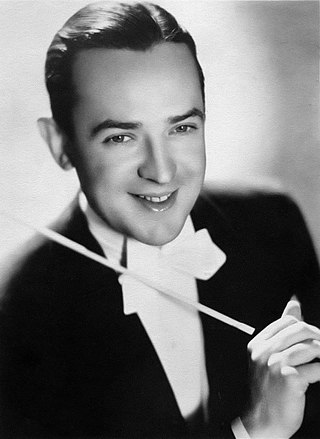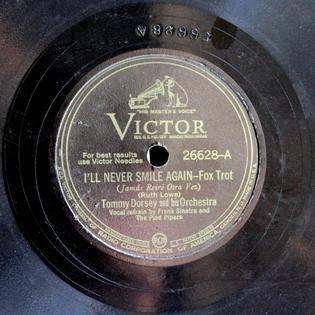Related Research Articles

Thomas Francis Dorsey Jr. was an American jazz trombonist, composer, conductor and bandleader of the big band era. He was known as the "Sentimental Gentleman of Swing" because of his smooth-toned trombone playing. His theme song was "I'm Getting Sentimental Over You". His technical skill on the trombone gave him renown among other musicians. He was the younger brother of bandleader Jimmy Dorsey. After Dorsey broke with his brother in the mid-1930s, he led an extremely successful band from the late 1930s into the 1950s. He is best remembered for standards such as "Opus One", "Song of India", "Marie", "On Treasure Island", and his biggest hit single, "I'll Never Smile Again".

"Stardust" is a 1927 song composed by Hoagy Carmichael, with lyrics later added by Mitchell Parish. It has been recorded as an instrumental or vocal track over 1,500 times. Carmichael developed a taste for jazz while attending Indiana University. He formed his own band and played at local events in Indiana and Ohio. Following his graduation, Carmichael moved to Florida to work for a law firm. He left the law sector and returned to Indiana, after learning of the success of one of his compositions. In 1927, after leaving a local university hangout, Carmichael started to whistle a tune that he later developed further. When composing the song, he was inspired by the end of one of his love affairs, and on the suggestion of a university classmate, he decided on its title. The same year, Carmichael recorded an instrumental version of the song for Gennett Records.

James Francis Dorsey was an American jazz clarinetist, saxophonist, composer and big band leader. He recorded and composed the jazz and pop standards "I'm Glad There Is You " and "It's The Dreamer In Me". His other major recordings were "Tailspin", "John Silver", "So Many Times", "Amapola", "Brazil ", "Pennies from Heaven" with Bing Crosby, Louis Armstrong, and Frances Langford, "Grand Central Getaway", and "So Rare". He played clarinet on the seminal jazz standards "Singin' the Blues" in 1927 and the original 1930 recording of "Georgia on My Mind", which were inducted into the Grammy Hall of Fame.

Axel Stordahl was an American arranger and composer who was active from the late 1930s through the 1950s. He is perhaps best known for his work with Frank Sinatra in the 1940s at Columbia Records. With his sophisticated orchestrations, Stordahl is credited with helping to bring pop arranging into the modern age.

"Misty" is a jazz standard written in 1954 by pianist Erroll Garner. He composed it as an instrumental in the traditional 32-bar format, and recorded it for the album Contrasts. Lyrics were added later by Johnny Burke. It appeared on Johnny Mathis' 1959 album Heavenly, and this recording reached number 12 on the U.S. Pop Singles chart later that year. It has since become Mathis’ signature song.

Melvin James "Sy" Oliver was an American jazz arranger, trumpeter, composer, singer and bandleader.

"I Can't Tell You Why" is a song by the American rock band Eagles that appeared on their 1979 album The Long Run. It was written by band members Timothy B. Schmit, Glenn Frey and Don Henley. Recorded in March 1978, it was the first song finished for the album and the first Eagles song to feature Schmit on lead vocals. Released as a single in February 1980, it became a Billboard top 10 hit in April, reaching number eight on the Billboard Hot 100 and number three on the Adult Contemporary chart. It was the group's last top ten hit on the Billboard Hot 100.
"Heart and Soul" is a popular song composed by Hoagy Carmichael with lyrics by Frank Loesser. It charted with different artists between 1938 and 1961. A simplified version is a popular piano duet.

"I'll Never Smile Again" is a 1939 song written by Ruth Lowe. It has been recorded by many other artists since, becoming a standard.
"The Lady Is a Tramp" is a show tune from the 1937 Rodgers and Hart musical Babes in Arms, in which it was introduced by former child star Mitzi Green. This song is a spoof of New York high society and its strict etiquette and phony social pretensions. It has become a popular music standard.

Harry Aaron Finkelman, known professionally as Ziggy Elman, was an American jazz trumpeter associated with Benny Goodman, though he also led his group Ziggy Elman and His Orchestra.
"East of the Sun " is a popular song written by Brooks Bowman, an undergraduate member of Princeton University's Class of 1936, for the 1934 production of the Princeton Triangle Club's production of Stags at Bay. It was published in 1934 by Santly Bros. and soon became a hallmark of the Princeton Tigertones, Princeton University's signature all-male a cappella group. The standard is also sung by the Princeton Nassoons.

Carl Kress was an American jazz guitarist.
"Indian Summer" is an American standard originally written as a piano piece by the prolific composer Victor Herbert. Al Dubin wrote lyrics for the tune in 1939, twenty years after Herbert wrote the tune.

Swing jazz emerged as a dominant form in American music, in which some virtuoso soloists became as famous as the band leaders. Key figures in developing the "big" jazz band included bandleaders and arrangers Count Basie, Cab Calloway, Jimmy and Tommy Dorsey, Duke Ellington, Benny Goodman, Fletcher Henderson, Earl Hines, Glenn Miller, and Artie Shaw. Duke Ellington and his band members composed numerous swing era hits that have become standards: "It Don't Mean a Thing " (1932), "Sophisticated Lady" (1933) and "Caravan" (1936), among others. Other influential bandleaders of this period were Benny Goodman and Count Basie.

The period from the end of the First World War until the start of the Depression in 1929 is known as the "Jazz Age". Jazz had become popular music in America, although older generations considered the music immoral and threatening to cultural values. Dances such as the Charleston and the Black Bottom were very popular during the period, and jazz bands typically consisted of seven to twelve musicians. Important orchestras in New York were led by Fletcher Henderson, Paul Whiteman and Duke Ellington. Many New Orleans jazzmen had moved to Chicago during the late 1910s in search of employment; among others, the New Orleans Rhythm Kings, King Oliver's Creole Jazz Band and Jelly Roll Morton recorded in the city. However, Chicago's importance as a center of jazz music started to diminish toward the end of the 1920s in favor of New York.

"The Morning After" is a 1937 song composed by Tommy Dorsey, Moe Jaffe, and Clay Boland. Tommy Dorsey and His Orchestra released the song as a Victor 78 single in 1937 with Jack Leonard on vocals.

"Harlem Chapel Chimes" is a 1935 jazz instrumental composed by Glenn Miller. The song was released as an A-side 78 single by the Dorsey Brothers Orchestra.
References
- 1 2 Whitburn, Joel (1996). The Billboard book of top 40 hits (6 ed.). New York: Billboard Books. p. 123. ISBN 0-8230-7632-6.
- ↑ "Louis Armstrong and his Orchestra". The Red Hot Jazz Archive. Archived from the original on 16 January 2013. Retrieved 3 May 2017.
- ↑ "1947-1949 - Sarah Vaughan". AllMusic. Retrieved 8 February 2017.
- ↑ "The Best of the Dinning Sisters". AllMusic. Retrieved 8 February 2017.
- ↑ "A Night at Birdland, Volume 1". AllMusic. Retrieved 22 December 2021.
- ↑ "Jimmy Raney Visits Paris, Volume 1". AllMusic. Retrieved 17 May 2024.
- ↑ "A Tribute to Tommy Dorsey - The Pied Pipers". AllMusic. Retrieved 6 June 2019.
- ↑ "Tribute to Clifford Brown - Lem Winchester,Ramsey Lewis Trio". AllMusic. Retrieved 8 February 2017.
- ↑ "Fats Domino - I Miss You So (Imperial LP-9138, January 1961)". musicbrainz.org. Retrieved 3 May 2020.
- ↑ "30 by Ella". AllMusic. Retrieved 8 February 2017.
- ↑ "Feels Good, Feels Right - Bing Crosby". AllMusic. Retrieved 8 February 2017.
- ↑ "Screen Gems - Elkie Brooks". AllMusic. Retrieved 8 February 2017.
- ↑ "That Old Feeling - Cleo Laine". AllMusic. Retrieved 8 February 2017.
- ↑ "The Way of the World - Mose Allison". AllMusic. Retrieved 8 February 2017.
- ↑ "Ukulele Songs - Eddie Vedder". AllMusic. Retrieved 8 February 2017.
- ↑ "Once in a While – Seth MacFarlane on iTunes". US: iTunes Store. Archived from the original on August 26, 2017. Retrieved December 19, 2017.
- ↑ "Shut up 'N Play Yer Guitar – Box Set". Archived from the original on 2016-04-27.